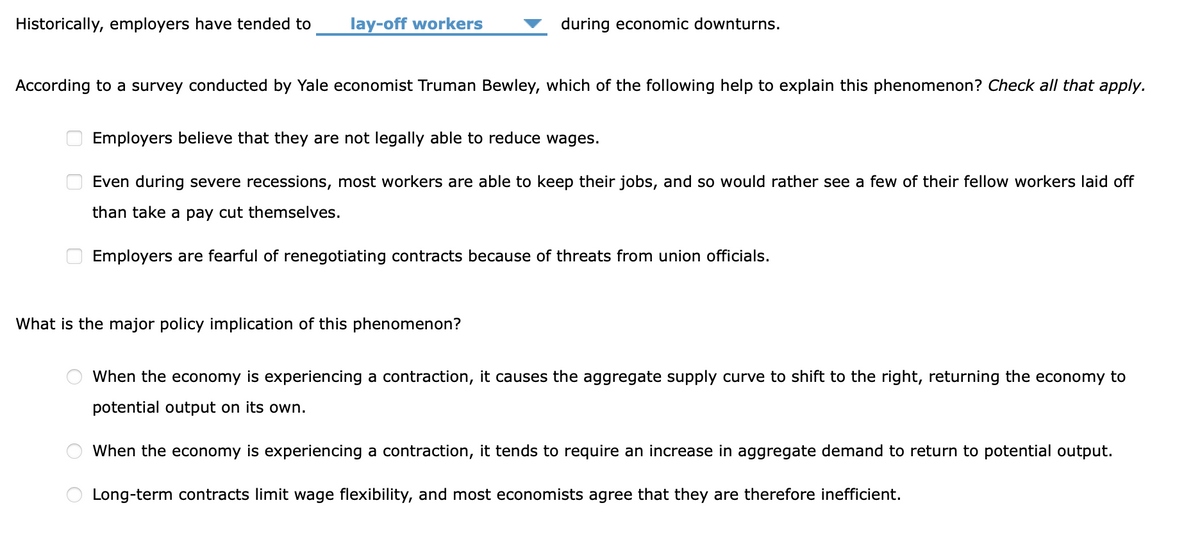ployers believe that they are not legally able to reduce wages. en during severe recessions, most workers are able to keep their jobs, and so would rather see a few of their fellow workers laid off an take a pay cut themselves. ployers are fearful of renegotiating contracts because of threats from union officials. major policy implication of this phenomenon? en the economy is experiencing a contraction, it causes the aggregate supply curve to shift to the right, returning the economy to tential output on its own. en the economy is experiencing a contraction, it tends to require an increase in aggregate demand to return to potential output.
ployers believe that they are not legally able to reduce wages. en during severe recessions, most workers are able to keep their jobs, and so would rather see a few of their fellow workers laid off an take a pay cut themselves. ployers are fearful of renegotiating contracts because of threats from union officials. major policy implication of this phenomenon? en the economy is experiencing a contraction, it causes the aggregate supply curve to shift to the right, returning the economy to tential output on its own. en the economy is experiencing a contraction, it tends to require an increase in aggregate demand to return to potential output.
Principles of Economics 2e
2nd Edition
ISBN:9781947172364
Author:Steven A. Greenlaw; David Shapiro
Publisher:Steven A. Greenlaw; David Shapiro
Chapter21: Unemployment
Section: Chapter Questions
Problem 35CTQ: While unemployment is highly negatively correlated with the level of economic activity, in the real...
Related questions
Question

Transcribed Image Text:Historically, employers have tended to
lay-off workers
during economic downturns.
According to a survey conducted by Yale economist Truman Bewley, which of the following help to explain this phenomenon? Check all that apply.
Employers believe that they are not legally able to reduce wages.
Even during severe recessions, most workers are able to keep their jobs, and so would rather see a few of their fellow workers laid off
than take a pay cut themselves.
Employers are fearful of renegotiating contracts because of threats from union officials.
What is the major policy implication of this phenomenon?
When the economy is experiencing a contraction, it causes the aggregate supply curve to shift to the right, returning the economy to
potential output on its own.
When the economy is experiencing a contraction, it tends to require an increase in aggregate demand to return to potential output.
Long-term contracts limit wage flexibility, and most economists agree that they are therefore inefficient.
O O
O O
Expert Solution
This question has been solved!
Explore an expertly crafted, step-by-step solution for a thorough understanding of key concepts.
Step by step
Solved in 2 steps

Knowledge Booster
Learn more about
Need a deep-dive on the concept behind this application? Look no further. Learn more about this topic, economics and related others by exploring similar questions and additional content below.Recommended textbooks for you

Principles of Economics 2e
Economics
ISBN:
9781947172364
Author:
Steven A. Greenlaw; David Shapiro
Publisher:
OpenStax


Economics (MindTap Course List)
Economics
ISBN:
9781337617383
Author:
Roger A. Arnold
Publisher:
Cengage Learning

Principles of Economics 2e
Economics
ISBN:
9781947172364
Author:
Steven A. Greenlaw; David Shapiro
Publisher:
OpenStax


Economics (MindTap Course List)
Economics
ISBN:
9781337617383
Author:
Roger A. Arnold
Publisher:
Cengage Learning